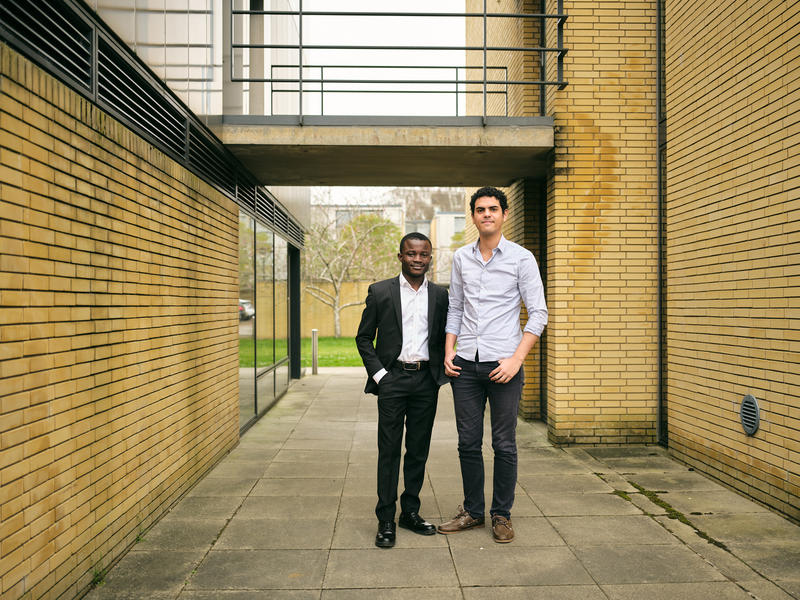Interview with CSAE Scholarship Holders 2025
We talked to Thomas Amoani (holder of the St Antony’s DAC African Economics Scholarship) and Karim Boudlal (holder of the Waverley Scholarship, based at The Queen's College) about their experiences as MPhil in Economics scholarship holders.
What are your research interests?
TA: My research interests lie in macroeconomics, with a particular focus on monetary theory and policy. I am especially interested in understanding how central bank tools—such as interest rates, quantitative easing, and forward guidance—affect macroeconomic outcomes like inflation, output, and employment. I’m also particularly curious about how these tools function in the context of large economic shocks or when economies approach the zero lower bound, where traditional policy levers may lose effectiveness. During my undergraduate studies, I explored how these tools influenced economic recovery and inflation dynamics in advanced economies such as the UK and the US. Looking ahead, I am keen to expand this analysis to emerging and developing economies, like Ghana, which face unique challenges such as external debt, inflation volatility, and underdeveloped financial systems. I aim to generate insights that help tailor central bank policy to different economic environments to promote sustainable growth and macroeconomic stability.
KB: I am interested in studying structural transformation, that is a country's transition from low-productivity to high-productivity sectors. Specifically, I want to look at the ways development interacts with technology in a global context. Is there such a thing as "inappropriate technology," technology that is too rudimentary or (more interestingly) too advanced to be conducive to sustainable growth? If so, what are the determinants of appropriate technology? How can developing countries find the technologies that work best for them in a globalised world? I hope to mobilise novel data from North Africa to study these questions and bridge part of the knowledge gap around the region.

Thomas Amoani (left) and Karim Boudlal (right)
How important has the scholarship been for you?
KB: Thanks to the scholarship, I have been able to dedicate myself to my classes and coursework as part of the MPhil in Economics without financial worry. Coming from a lower middle-class background in Morocco, the invaluable opportunity this represents is not lost on me. In particular, the studentship has allowed me to find time for research projects beyond the coursework required for my program and to explore a number of fulfilling extracurriculars. These include a paper on the 1952 land reform in Egypt, a reading group I put together to explore alternative ways of thinking about economics, as well as various creative and athletic pursuits.
TA: The CSAE scholarship has been absolutely transformative. Coming from a small town in Ghana, my journey to Oxford has been marked by immense financial hardship and uncertainty. The studentship made it financially possible for me to pursue graduate studies at one of the world’s leading institutions and reaffirmed my belief in the power of education to change lives. It’s not just a scholarship—it’s a symbol of hope, and a bridge that connects potential to opportunity. Without it, attending Oxford would have remained a distant dream.
What is your experience being part of the CSAE network at the University of Oxford?
TA: Being part of the CSAE network is incredibly enriching. It provides a platform to engage with leading scholars and fellow students passionate about development economics and African economic policy. I especially appreciate the opportunity to participate in seminars, workshops, and discussions deeply relevant to the issues I care about, such as macroeconomic management in low- and middle-income countries. Most recently, I found the CSAE Conference 2025 particularly beneficial and intellectually stimulating—it offered an excellent platform to exchange ideas, explore new research, and gain insight into the latest empirical work across Africa.
KB: Economists can sometimes fall into a certain kind of aloofness in their work. It can be easy to forget the realities and people behind our models and equations and so forget the reasons we chose to study Economics in the first place. I never felt this was the case at the CSAE. The people I spoke to here seemed not only passionate about their research but also acutely aware of the stakes of it. The CSAE has also provided me with numerous opportunities to connect with scholars from Africa in fruitful ways—a rare boon in the current structure of global academia. We hear a lot about the need to connect academics and universities across the Global North and South, but the CSAE seems to be one of the few institutions actively working towards that goal.
Every step of my journey has reinforced the importance of resilience, access, and support. From walking 6km to school daily in my hometown to graduating as the top economics student at Brunel and now studying at Oxford, I’ve learned that potential knows no geography. I am immensely grateful for the support I’ve received. I hope to one day give back by helping shape policies that improve economic outcomes for others, particularly in developing economies. CSAE has given me the tools and platform to begin that journey, and I’m determined to make it count.
Thomas Amoani





